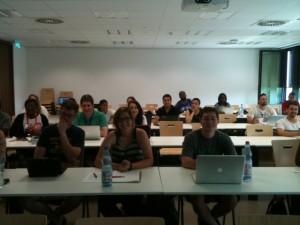Schnitzel, Beer, and Marketing Your Study Abroad Experience
 This past summer I was fortunate to have had the opportunity to participate in Marquette University Law School’s summer program in Giessen, Germany. The program, run jointly with the University of Wisconsin Law School and Justus Liebig University in Giessen, provides Marquette students with the opportunity to study a variety of international law topics at a foreign university with classmates from around the globe. Course offerings this past summer included Comparative Law, International Economic Law & Business Transactions, International Intellectual Property Law, and the Law of Armed Conflict. The courses were taught by both American and German professors over the course of a (somewhat intense) four week period that included weekend excursions to Munich and Berlin. While the subject matter of the classes was incredibly interesting, this was further magnified by the international make-up of the student body. My classmates this past summer hailed from 17 different countries including the United States Mexico, Brazil, Peru, Germany, Spain, Moldova, Turkey, India, Sri Lanka, Vietnam, South Korea, China, Benin, Senegal, Cameroon, and Ethiopia. The discussions and conversations we had, both in and out of the classroom, provided insights about international legal issues that would be difficult to duplicate outside of such an experience. Not only was I able to learn about international, German, and EU law, but I was also able to gain a better understanding of US law.
This past summer I was fortunate to have had the opportunity to participate in Marquette University Law School’s summer program in Giessen, Germany. The program, run jointly with the University of Wisconsin Law School and Justus Liebig University in Giessen, provides Marquette students with the opportunity to study a variety of international law topics at a foreign university with classmates from around the globe. Course offerings this past summer included Comparative Law, International Economic Law & Business Transactions, International Intellectual Property Law, and the Law of Armed Conflict. The courses were taught by both American and German professors over the course of a (somewhat intense) four week period that included weekend excursions to Munich and Berlin. While the subject matter of the classes was incredibly interesting, this was further magnified by the international make-up of the student body. My classmates this past summer hailed from 17 different countries including the United States Mexico, Brazil, Peru, Germany, Spain, Moldova, Turkey, India, Sri Lanka, Vietnam, South Korea, China, Benin, Senegal, Cameroon, and Ethiopia. The discussions and conversations we had, both in and out of the classroom, provided insights about international legal issues that would be difficult to duplicate outside of such an experience. Not only was I able to learn about international, German, and EU law, but I was also able to gain a better understanding of US law.
The value of a study abroad experience, both in terms of the substantive knowledge gained as well as the “soft” skills developed, is likely to be clear to someone who teaches or participates in such a program (see Professor Fallone’s semi-exhaustive list of ten reasons why one should study abroad). However, those less familiar with international study experiences may not always ascribe the same value or benefit to study abroad programs. This can be problematic for law students who hope to show potential employers that their time spent studying overseas was more than just an excuse to sample copious amounts of schnitzel and beer. While CALI awards, clerkships, internships, pro bono work, and participation in law review or moot court are all ways that students have traditionally distinguished themselves to potential employers, the same has not been true for participation in study abroad programs, which are a relatively new phenomena in the law school curriculum.

